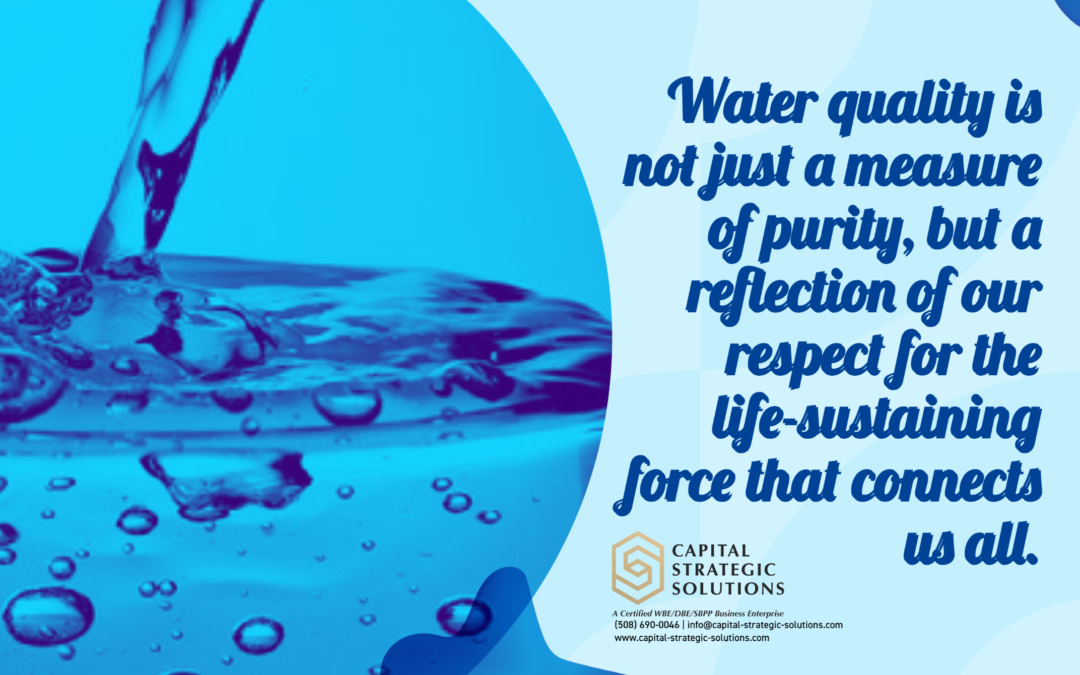Though August is water quality month, in recent years water quality has been popping up in conversation more frequently outside of it’s month of recognition. Per- and polyfluoroalkyl substances (PFAS) has been in the news frequently, as states adjust regulations around Maximum Contaminant Levels (MCL), and as the Environmental Protection Agency (EPA) continues to research the long-term health impact of PFAS and Gen X chemicals. Massachusetts communities have been working on PFAS contamination since the state’s Department of Environmental Protection (MassDEP) announced a more restrictive MCL for PFAS in 2020, lowering it to 20 ppt. This change has fueled ongoing projects across the state that our team has been able to witness firsthand. In our time working with multiple communities and water quality stakeholders, we have gained immense insight into community responses to PFAS, and how the solution is crafted.
We recognize that there is no ‘one size fits all’ solution for PFAS, each community needs a tailored approach as the circumstances of their existing water infrastructure play a huge role in deciding how to respond to elevated levels of PFAS. No matter what infrastructure solution best suits a community’s needs, communicating about PFAS is crucial. Community members need to be educated not only about the health effects caused by PFAS so that they can take appropriate actions, but they also need to be educated about their water source, the infrastructure that brings water to their home, and the work that is being performed ‘behind the scenes’ to protect public health. For areas affected by PFAS contamination, clear communication provides guidance on remediation efforts, including water filtration methods, soil treatments, and more. Proper communication ensures that people are not only aware but also empowered to make decisions that protect their well-being and that of the environment.
Our outreach team has been embedded in PFAS communication and education across the Commonwealth. From delivering notices and door hangers, designing web pages with PFAS guidance and advisories, and operating water quality hotlines for communities, our team works diligently to ensure that community stakeholders can absorb information in bite size digestible pieces. These communication tactics have proven successful in multiple communities that are each pursuing different paths. The collaboration between these outreach methods and mediums has allowed us to communicate the complex details of PFAS in every corner of a community. Using traditional and digital forms of outreach ensured a wide reach of PFAS information. The water quality hotlines in particular have been a useful resource that allows community members to call in to learn information firsthand, easing tension and allowing for a greater understanding of what water suppliers are up against.
By building a conversation with the public, community members not only walk away with the information they need to make informed decisions about their and their family’s health, but they also gain a renewed sense of commitment to their water community which makes it easier to tackle an issue as complicated as PFAS. Effective communication and education with the public have a long lasting and exponential benefit, as earning the public’s trust with clear communication and honesty will carry a community through a long, long road to remedying PFAS.
The Massachusetts Clean Water Trust, in conjunction with the MassDEP and EPA have announced $212M in state revolving loan funds to pay for 26 PFAS-related drinking water projects. These grants will be available through 2026. The EPA allotted $38M to Massachusetts for small or disadvantaged communities over the next two fiscal years for the Emerging Contaminates Grant (including PFAS) for testing, planning & design, treatment, and public water suppliers’ consolidation and creation. CSS’s grant management team has been assisting communities in navigating federal and state funding opportunities to mitigate water quality issues and provide financial support for water infrastructure improvements.
Whether it’s our outreach team directing communications, our grant team assisting with the financing for infrastructure improvements, our team of municipal experts can seamlessly integrate with your staff to provide support during the study, design and construction phases of water quality projects. The future of water quality in the face of PFAS and evolving regulation is unknown, however making persistence and transparency tenants of your plans will ensure the community is informed and supported throughout the process.

